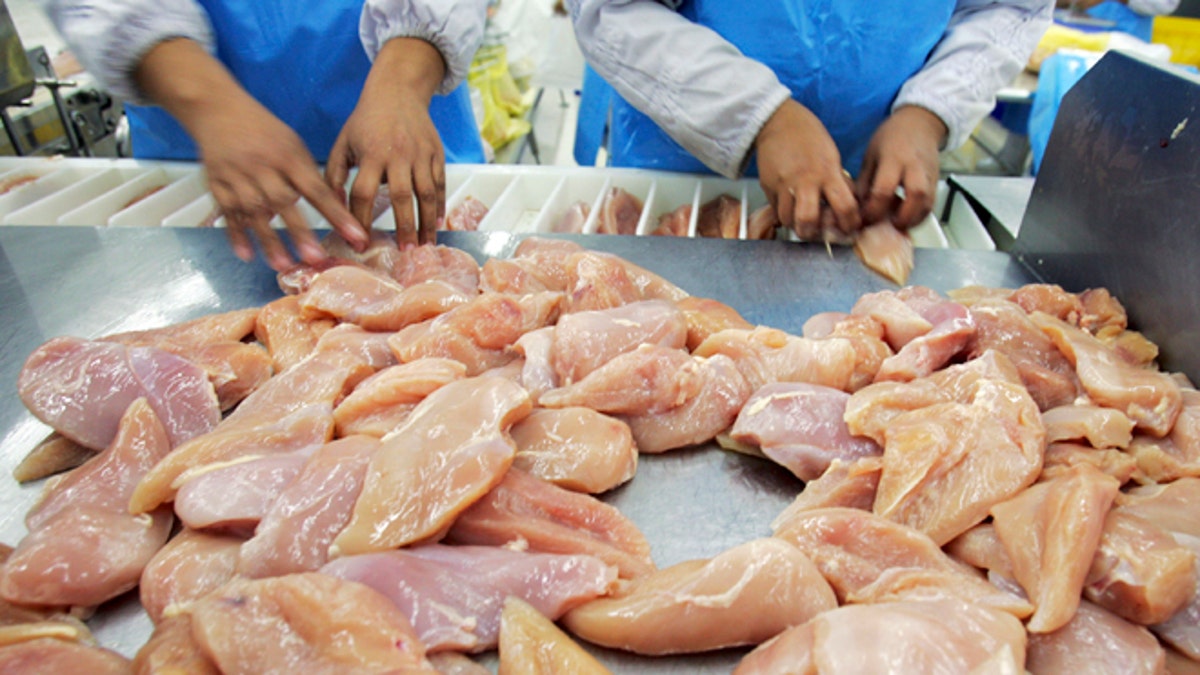
CHONBURI, THAILAND - JULY 9: Chicken breasts get sorted at the Thai Poultry Group (TPG) chicken processing and slaughtering factory July 9, 2005 in Chonburi, Thailand. The factory has 1,200 employees that are able to deal with 10,000 birds per hour at full capacity. However since Bird Flu outbreak, the processing plant has had to cut its production almost 40%. The Thai Poultry Group exports to European Union, Japan, Middle East, Hong Kong and South Korea. (Photo by Paula Bronstein/Getty Images) (2005 Getty Images)
Imagine arriving to work knowing that during your eight- to ten-hour shift you will be standing in the same place, doing the same repetitive movement and – when you felt the need to use the restroom – you’ll be told that you cannot, and so to be forced to urinate or defecate on yourself.
These are the repugnant working conditions of U.S. poultry workers as described in a new report from Oxfam America.
The paper, titled "Lives on the Line: The High Human Cost of Chicken," focuses on the four largest American poultry processing firms: Tyson Foods, Pilgrim’s Pride, Perdue Farms and Sanderson Farms – sites where hundreds of workers told the human-rights organization that standing on the line, faced with an endless stream of chicken carcasses, they were not allowed to leave for bathroom breaks, to rest or to stretch.
The majority of poultry workers are Latinos, and most are women.
"I had to wear Pampers. I and many, many others had to wear Pampers," one worker told Oxfam, an admission the organization found to be surprisingly common.
“Only in the poultry industry are the workers not allowed to go to the bathroom," Debbie Berkowitz, who used to work at OSHA and is now a senior fellow at the National Employment Law Project and contributed to the Oxfam report, told Fox News Latino. "It’s against the law to not allow people to use the bathroom."
The poultry industry is notoriously physically demanding and dangerous for its workers. The turnover can be extremely high, so companies rely on immigrant workers, who are likelier to be too afraid to speak up about the working conditions.
Responding to the Oxfam report, Perdue said in a statement that its employees – which the company refers to as "associates" – receive two 30-minute breaks during each eight-hour shift. The company also cited a survey of more than 16,000 employees conducted in November 2015, saying that 90 percent of their associates felt positively about their jobs, and 88 percent were positive about safety and working conditions.
Tyson said in a statement that they met with officials of Oxfam America and the Northwest Arkansas Workers’ Justice Center to discuss concerns. “We’ve told them that while we believe we’re a caring, responsible company, we’re always willing to consider ways we can do better.We value our Team Members and treat them with respect. If they need a restroom break, we have extra people who can fill in for them. We do not tolerate the refusal of requests to use the restroom,” the statement read.
Berkowitz said, "In 1998, [OSHA] came out with a memo telling poultry plants that they have to allow workers to go to the bathroom. I was shocked that in 2015, workers talked to our investigators telling us that they were going to the bathroom on themselves. I thought this issue was over, [but] it’s rampant.”
Experts who oversee the industry say the way workers are treated varies. At many of the unionized plants, workers receive better treatment.
“This report doesn’t surprise me," Johnny Whitaker, president of the Mid-South Council of the Retail, Wholesale and Department Store Union (RWDSU), told FNL. "What the report claims doesn’t take place in union shops. We negotiate the breaks and benefits. We have a lot of discussion about bathroom breaks, and they’re a hot topic. You do have people who abuse the rules, but in the union shops the employees know they have rights.”
The demand for chicken in the U.S. has grown considerably in the last 35 years. Industrialized poultry plants now operate around the clock to process more than 23 million chickens a day (8.5 billion chickens in 2013).
According to the Oxfam report, workers say they process around 35 to 45 birds per minute – more than 2,000 chickens per hour, more than 14,000 chickens a shift – all in conditions few could endure.
In a 2013 report by the Southern Poverty Law Center about an Alabama poultry processing plant, a Cuban immigrant identified by the pseudonym Oscar, claimed that the repetitive motion of folding around 18,000 wings a day caused tendinitis and carpal tunnel syndrome and left him unable to work. So the company fired by the company.
Also mentioned in the SPLC report was a Latino father of three living in Alabama since 1999, who worked for six years at a poultry plant.
His job required him to lift, carry and stack two 80-pound boxes of chicken every minute. While lifting a box one day, he became dizzy, slipped and fell to the ground. He was told to go right back to work despite being in great pain.
His back pain worsened, and he was unable to sleep. When he finally got X-rays, they revealed two fractured lumbar vertebrae. He too was eventually fired.
“There are numerous cases of people losing limbs, working with faulty equipment and then simply being let go because they could no longer work," Berkowitz told FNL. "We felt like this needed to go public. That the public needs to put pressure on poultry companies to treat chickens humanely and also treat the workers humanely. Sadly, there’s no company that’s doing it right yet.”
